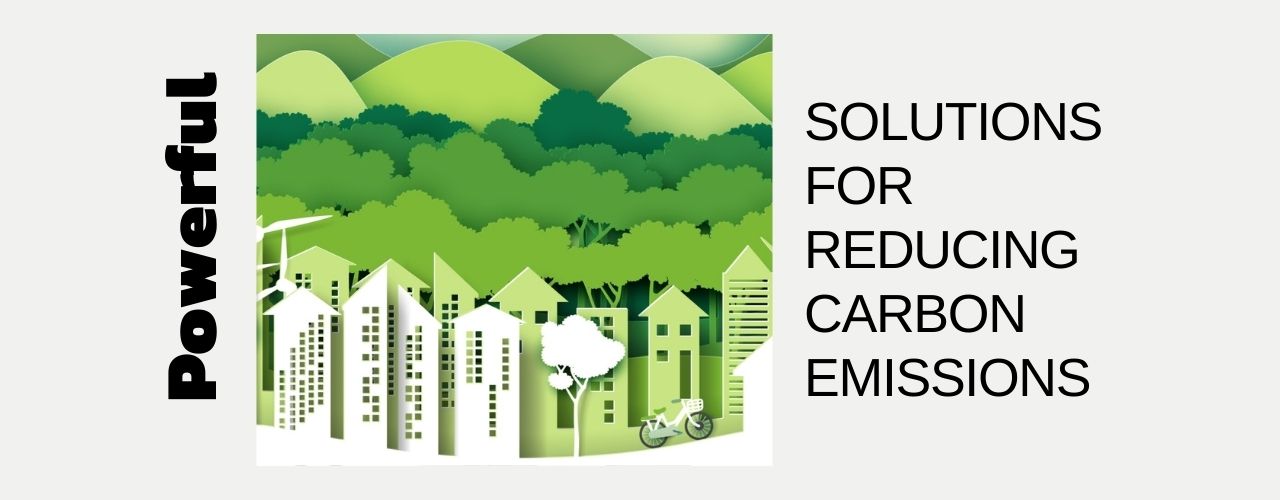Powerful Solutions for Reducing Carbon Emissions

In the face of climate change, finding effective solutions for reducing carbon emissions is essential. Businesses, in particular, have a significant role to play in implementing these solutions and driving positive change.
This blog explores powerful strategies and initiatives that can make a substantial impact in reducing carbon emissions. From adopting carbon negative materials like plant-based plastic to implementing energy-efficient practices, there are numerous solutions available. We will delve into the importance of these solutions for mitigating climate change and discuss the benefits they offer. Join us on this journey as we explore the transformative power of solutions for reducing carbon emissions.
What is Carbon Emissions?
In our quest for sustainable living and a greener future, understanding carbon emissions and solutions for reducing carbon emissions is crucial. This section will delve into the definition of carbon emissions, explore their sources and causes, and highlight their impact on the environment. By comprehending the intricacies of carbon emissions, we can better identify and implement effective solutions for reducing them.
Carbon emissions refer to the release of carbon dioxide (CO2) and other greenhouse gasses into the atmosphere. These emissions are primarily generated through human activities, such as the burning of fossil fuels for energy production, industrial processes, deforestation, and transportation. The accumulation of these gases in the atmosphere contributes to the greenhouse effect, leading to global warming and climate change.

There are various sources of carbon emissions, each contributing to the overall carbon footprint. The burning of fossil fuels, such as coal, oil, and natural gas, for electricity and heat generation is a significant source. Industrial processes, including manufacturing and chemical production, also release substantial amounts of carbon emissions. Additionally, deforestation and land-use changes contribute to carbon emissions as forests, which act as carbon sinks, are cleared.
The impact of carbon emissions on the environment is far-reaching and profound. The excessive release of greenhouse gases traps heat in the atmosphere, resulting in global warming. This, in turn, leads to rising temperatures, altered weather patterns, increased frequency and intensity of extreme weather events, and the loss of biodiversity.
Furthermore, carbon emissions contribute to ocean acidification, threatening marine ecosystems and coral reefs. The overall consequences of carbon emissions pose significant risks to the planet's ecological balance and the well-being of both humans and wildlife.
Understanding carbon emissions is crucial for developing effective solutions to reduce their impact on the environment. By recognizing the sources and causes of carbon emissions, we can take targeted actions to mitigate their effects. The next section will explore powerful solutions for reducing carbon emissions, offering actionable steps towards a more sustainable future.
Carbon Offsetting and Sequestration
One of the key solutions for reducing carbon emissions is carbon offsetting and sequestration. Understanding these processes and their benefits can play a vital role in combating climate change and achieving a greener future. This section will delve into the concept of carbon offsetting, the importance of supporting reforestation and afforestation projects, and the innovative carbon sequestration technologies and initiatives.
Carbon offsetting is a mechanism that allows individuals and organizations to compensate for their carbon emissions by investing in projects that reduce or remove greenhouse gasses from the atmosphere. By supporting these projects, such as renewable energy initiatives or forest conservation programs, individuals and businesses can offset their carbon footprint and contribute to a more sustainable planet.

One effective way to offset carbon emissions is through reforestation and afforestation projects. Planting trees not only helps to absorb carbon dioxide through photosynthesis but also promotes biodiversity, prevents soil erosion, and enhances ecosystem health. By supporting these projects, we can create new forests or restore degraded ones, allowing them to act as carbon sinks and mitigate climate change.
Additionally, carbon sequestration technologies and initiatives play a crucial role in reducing carbon emissions. These innovative solutions aim to capture and store carbon dioxide from industrial processes or the atmosphere itself. One notable example is plant-based plastic, a carbon-negative material. Made from renewable resources, plant-based plastics not only reduce the reliance on fossil fuel-based plastics but also capture and store carbon during their growth cycle.
By incorporating plant-based plastic into various industries and everyday products, we can actively contribute to reducing carbon emissions and promoting a more sustainable future. From packaging materials to bioplastic toys, these carbon-negative materials offer a tangible way to address the environmental challenges we face.
In conclusion, carbon offsetting and sequestration provide powerful solutions for reducing carbon emissions. By understanding the concept of carbon offsetting, supporting reforestation and afforestation projects, and embracing innovative carbon sequestration technologies, we can actively combat climate change and work towards a more sustainable world. Incorporating carbon-negative materials, such as plant-based plastic, into our daily lives further enhances our efforts to reduce carbon emissions and create a greener future for generations to come.
Powerful Solutions for Reducing Carbon Emissions
Businesses play a crucial role in reducing carbon emissions and mitigating the impacts of climate change. Fortunately, there are several effective solutions available for businesses to adopt. One notable solution is the use of plant-based plastic, such as the innovative product produced by AirX. Plant-based plastic offers a sustainable alternative to traditional plastic materials and has the potential to significantly reduce carbon emissions.

Plant-based plastic is derived from renewable resources, such as agricultural by-products, which would otherwise go to waste. By utilizing these by-products, plant-based plastic production helps to minimize greenhouse gas emissions associated with traditional plastic production. Additionally, plant-based plastic has the unique ability to capture carbon during its growth and manufacturing process, effectively sequestering carbon from the atmosphere.
Another key aspect to consider is the life cycle of plant-based plastic. Unlike conventional plastics that persist in the environment for hundreds of years, plant-based plastic is designed to biodegrade, reducing its environmental impact. This life cycle approach ensures that plant-based plastic not only helps to reduce carbon emissions during production but also minimizes the long-term environmental footprint.
In addition to adopting plant-based plastic, businesses can implement other strategies to reduce carbon emissions. These may include energy efficiency measures, such as upgrading to energy-efficient equipment, utilizing renewable energy sources, and implementing conservation practices. By optimizing energy consumption and reducing reliance on fossil fuels, businesses can make significant strides in reducing their carbon footprint.
Furthermore, implementing sustainable transportation practices, such as promoting telecommuting, encouraging the use of public transportation, and adopting electric vehicles for company fleets, can greatly contribute to carbon emission reduction.
It's important for businesses to prioritize sustainability and actively seek solutions for reducing carbon emissions. By embracing innovative alternatives like plant-based plastic, adopting energy-efficient practices, and implementing sustainable transportation strategies, businesses can play a vital role in creating a more sustainable and low-carbon future. Together, these solutions contribute to a healthier planet and a greener future for generations to come.
>>> Learn more: Sustainable Playtime: Discovering Bioplastic Toys for Kids
Contact us
AirX is the world's first carbon-negative bio-material made from coffee grounds manufacturer.
We specialize in producing bio-based composites using recycled carbohydrates derived from by-products such as coffee grounds, coconut husk, husk, and bamboo. Our goal is to promote sustainability through the use of eco-friendly materials.
We are always here to help and provide the best service possible. If you have any questions or would like to receive advice and feedback directly from our sales staff, please do not hesitate to contact us. You can reach us through:
- Whatsapp: +84 969 742 950
- Email: [email protected]
We look forward to hearing from you!

